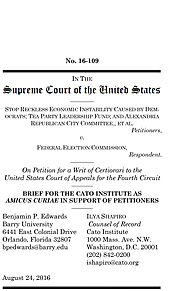Stop Reckless Economic Instability Caused by Democrats (Stop REID) v. FEC
Learn more about Cato’s Amicus Briefs Program.
When people want to join together to spend money in an election campaign, federal law requires them to form a “political action committee” or PAC. Most PACs are allowed to donate up to $5,000 to any candidate in an election. If a PAC has been registered for less than six months, however, this maximum donation is inexplicably lowered to $2,700 per candidate. Since the 1974 case of Buckley v. Valeo, the Supreme Court has consistently held that limitations on campaign contributions “implicate fundamental First Amendment interests.” And only two years ago, in McCutcheon v. FEC, the Court reiterated that such limits could only be justified if they reduce quid pro quo corruption (or its appearance). By that standard, the $2,700 limit on new PACs is clearly unconstitutional: If a $5,000 donation from a seven-month-old PAC does not run the risk of corruption, it’s hard to see how a $2,701 donation from a five-month-old PAC does. Making just this argument, a new PAC sued the Federal Election Commission. There was just one problem: Although this plaintiff PAC was less than six months old when the case was filed, it was more than six months old when the district court ruled. For that reason, the U.S. Court of Appeals for the Fourth Circuit held that it could not rule on the constitutionality of the $2,700 limit because the question had become “moot”; the limit no longer applied to the particular PAC that had brought the case. Reconciling mootness doctrine with the realities of our lengthy judicial process is not a new problem. Courts have long recognized that some laws would be impossible to challenge under the normally strict rules of mootness, because the harm caused by the law happens faster than it takes a case to wend its way through the legal system. That’s why courts developed the sensible “capable of repetition, yet evading review” exception to mootness: If a law is likely to repeatedly affect people, but always for short periods at a time, then courts will decide the merits of a challenge to that law no matter how long the litigation takes. Every court in the country agrees with this principle, but where the circuits have split is on a more particular question: does the harm have to be capable of repetition to the same plaintiff in order to waive mootness, or need it only be capable of repetition to the public as a whole? The approach of several prior Supreme Court cases, as well as the explicit precedent of four circuit courts, has been not to impose the “same plaintiff” requirement in election-law cases. But four other circuits, including now the Fourth Circuit, have continued to impose the “same plaintiff” rule in such cases. Given that split, Cato has filed a brief urging the Supreme Court to take this case and declare definitively that the “same plaintiff” requirement makes no sense in the election-law context. The facts of this case show how electoral regulations can be specifically designed to affect each individual entity only once, while still having an enormous cumulative effect on the electoral process as a whole. Under the Fourth Circuit’s approach, even a statute that blatantly violated the First Amendment, such as a complete ban on all spending by PACs that are less than six months old, could never be struck down. Indeed, so long as Congress always designed its one-time waiting periods to be just shorter than the length of a typical lawsuit, it could effectively do whatever it wanted. The Supreme Court should step in now before we move closer to that absurd result. A constitutional right hardly does much good if courts aren’t able to enforce it.
